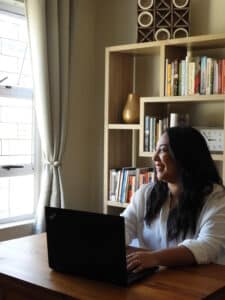Interview with guest researcher Megan Robertson
31 augusti, 2022

Picture Megan Robertson
Tell us a bit about yourself and your research interests.
I work as a senior researcher in the Desmond Tutu Centre for Religion and Social Justice (DTCRSJ) at the University of the Western Cape in South Africa. I work broadly in the areas of queer sexuality, gender, and religion. I obtained my PhD in 2020 which focused on the experiences of queer clergy in the Methodist Church of Southern Africa. My dissertation was selected as a finalist for the African Studies Review, Best Africa-Based Dissertation. I now teach, supervise and research in the areas of religion, gender and sexuality. I am also managing editor of the African Journal of Gender and Religion also housed in the DTCRSJ.
How did you hear about the Polin Institute and what is your connection to the Institute?
The head of research at the Polin Institute, Professor Mika Vähäkangas, also serves as Extraordinary Professor at the DTCRSJ. In looking for mutually beneficial ways to enhance the profile, reach, and strength of both our research centres, we decided that supporting promising post-doctoral and early-career scholars in publishing their work would be most beneficial. As I had recently completed my doctorate and was looking for opportunities to turn my work into a monograph, this partnership presented itself at an ideal time. I was therefore privileged to be the first visiting researcher from the DTCRSJ at the Polin Institute for 6 weeks between May and June 2022.
Tell us more about the project you were working on during your visit?
The primary focus of my time as a visiting researcher was to conceptualise and write a monograph based on my doctoral work with queer clergy in the Methodist Church of Southern Africa. Within six weeks I conceptualised the format, outline and wrote two chapters of the book! It must have been the inspiring Finnish midsummer.
The monograph reveals queer clergy life stories and explicates what these stores reveal about the Church that makes up such an integral part of not only how they make sense of their Christianity, but who they are and how they make meaning of their lives and experiences. In the book I am interested in the construction of Methodism in South Africa and whether there is a potential for this normative space of Christianity to also become a sacred queer place. This book provides a critical look at the institution which, just over ten years ago, discontinued a minister, Ecclesia De Lange, who married her same-sex partner. It also uncovers different forms of queer resistance in this context and looks at how heteropatriarchy is both constituted and subverted in the Church in various ways. My aim is to submit this monograph by the end of 2022 to Routledge to be considered for publication.
What were some of the highlights of your time with the Institute?
Thankfully my visit coincided with the TUTP conference at the University of Helsinki which the Polin Institute facilitated me to participate in. This was my first in-person conference in two years due to the Covid pandemic. This conference was an excellent introduction to the work of Finnish scholars in religion and theology and allowed me to present my work to an international audience. This helped me to think about the readers of my monograph and how I could make it relevant for a broad scholarly audience. I also met some wonderful colleagues at Åbo Akademi who shared similar interests in queer studies, African studies, religion and the arts. In particular the connections made with the head of the Donner Institute, Dr Ruth Illman and the dean, Prof Peter Nynäs proved inspiring. I also made links with Finnish colleagues outside of Åbo Akademi such as Dr Henni Alava – a connection which has already produced a soon to be published praxis article.
Throughout my visit, I felt an enormous sense of welcome from all the staff and students I encountered during my trip. The interest and encouragement I received from everyone was unbelievable and I certainly felt like I was part of a community. This was in no small part thanks to Prof Vähäkangas and Laura Wickström who went out of their way to make sure I had everything I needed. The endless cups of good coffee didn’t hurt either. My hosts at the Polin Institute also encouraged me to see the sites of Helsinki, Turku (including a staff trip to the Life on a Leaf house) and even facilitated a visit to the archipelago for a magical midsummer celebration – an experience that will stay with me always.
Tell us more about your future projects.
I have since returned to South Africa and the DTRSCJ where I continue to supervise, teach and research. I am working on a few other writing projects I committed to, as well as continuing the work on my monograph.
I have also recently been awarded a Marie Skłodowska-Curie Individual Fellowship which I will take up in 2023 at the University of Leeds with Prof Adriaan van Klinken. The project title is ”Sex and the Sacred: Queering Black Performing Arts in South Africa”. The project is particularly interested in exploring the potential of the performing arts for (re)constructing the narrative of queerness and the sacred in South Africa. “Sex and the Sacred” holds great potential for (re)imagining political and social orders and queer futurity in the country. I am very excited to begin this new project and I hope to continue to connect with the Polin Institute and the Åbo Akademi University as it develops.
How can people reach out to you if they are interested in your work?
Those interested can contact me using my email address, mrobertson ( at ) uwc.ac.za. They can also follow me on twitter @PearlThornbird. You can also view the work of the DTCRSJ with which I am affiliated on our website. I am also the managing editor of the African Journal of Gender and Religion and I can be contacted for journal queries at ajgr ( at ) uwc.ac.za and you can follow us on twitter (@_AJGR).

